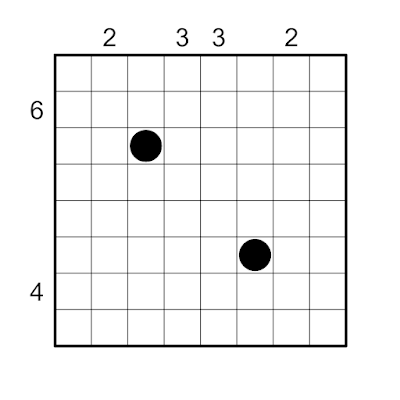#26 - UKPA 2024 Leftovers
Creating puzzles for a contest (especially an entire UKPA round) comes with leftover puzzles. I did not feel like retaining these for other purposes, as they had already been tested by a few people. In case these puzzles feel familiar, they have also been posted at the website of the Dutch puzzle federation WCPN before. Hope you will enjoy these leftovers!
Snake
The Snake puzzle in the contest was already my least favorite of the set, but this puzzle was not better. For some reason I feel like my Snake setting creates either bashy puzzles or super trivial puzzles, definitely something I could improve on.
Rules
Shade some cells to form a 1 cell wide snake of unknown length, whose head and tail are given. The snake does not touch itself, not even diagonally. Numbers outside the grid indicate the number of cells in that row/column that are occupied by the snake.
Pentominous
While I really liked this puzzle, it ended up being a bit too hard to include in the contest, as I wanted top solvers to be able to finish the round.
Rules
Divide the grid into pentominoes (five cell regions) so that no two pentominoes of the same shape (including rotations and reflections) share an edge. Black cells cannot be part of any pentomino shape. A cell with a letter in it must be part of the pentomino associated with that letter. Not all pentomino shapes need to be used.
Castle Wall
This would have been a nice and easy puzzle for the round, but after creating the 24 themed puzzle, I had to include that one for the contest instead.
Rules
Draw a single closed loop through the grid. The loop travels horizontally and vertically and must not touch or cross itself. There are black and white clue cells in the grid. White clue cells must be inside the loop; black clue cells must be outside the loop. Numbers in clue cells indicate the total length of the loop segments in the direction of the arrow.
Castle Wall
If I would have included two classic puzzles of each type in the round, this would have been a good harder Castle Wall. It uses some logic that is probably quite common for experienced solvers, but tricky for newer solvers.
Kurodoko
This puzzle requires one to understand the interaction between some clues to solve it, making it easy if you know it, but hard if you have no clue where to look. That's why it did not feel like a nice contest puzzle to me, yet it should be interesting for a casual solve.
Rules
Shade some cells. No numbered cell may be shaded. A number indicates how many cells can be seen (including the cell itself) from that cell horizontally or vertically up to the edge of the grid or a shaded cell (whichever is reached first). No two shaded cells may share an edge. All the white cells must form a single orthogonally connected area.
Kurodoko
Diagonal clues in Kurodoko can get a bit funky. It would have been a nice harder puzzle, but did not fit in the round now. I actually only noticed now that I'm setting it up for publication that I completely messed up the symmetry in this one as well, so I'm even more glad that it was not used for the contest.
Japanese Sums
Apart from lacking one clue in column 2 for nice aesthetics, I really like this puzzle. The interactions of all low number clues give it a different vibe to most Japanese Sums puzzles. This theming with 24 was also quite nice, but I just ended up liking the contest puzzle a bit better, hence making this a leftover puzzle.
Rules
Place the digits 1 to 6 in some cells, so that no digit is repeated in any row or column. Numbers on the outside indicate the sums of consecutive digits in that row or column. The sums are given in the order they appear in the grid. Each sum is separated by at least one empty cell.

.png)






.png)

Comments
Post a Comment